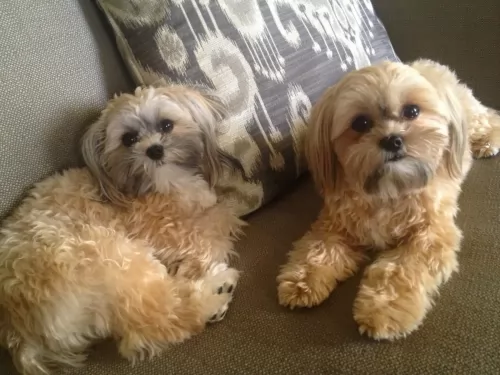 Petzlover
Petzlover Shorkie is originated from United States but Tibetan Terrier is originated from China. Shorkie may grow 17 cm / 6 inches shorter than Tibetan Terrier. Shorkie may weigh 7 kg / 15 pounds lesser than Tibetan Terrier. Both Shorkie and Tibetan Terrier has same life span. Shorkie may have less litter size than Tibetan Terrier. Both Shorkie and Tibetan Terrier requires Moderate Maintenance.
Shorkie is originated from United States but Tibetan Terrier is originated from China. Shorkie may grow 17 cm / 6 inches shorter than Tibetan Terrier. Shorkie may weigh 7 kg / 15 pounds lesser than Tibetan Terrier. Both Shorkie and Tibetan Terrier has same life span. Shorkie may have less litter size than Tibetan Terrier. Both Shorkie and Tibetan Terrier requires Moderate Maintenance.
 The Shorkie is a mix between a Yorkshire Terrier and a Shih Tzu. This little dog actually thinks he’s quite big. He is a great watchdog and a barker, and he is a loyal and loving member of his family. He will let you know if he thinks something is going on that shouldn’t be.
The Shorkie is a mix between a Yorkshire Terrier and a Shih Tzu. This little dog actually thinks he’s quite big. He is a great watchdog and a barker, and he is a loyal and loving member of his family. He will let you know if he thinks something is going on that shouldn’t be.
This hybrid combines two breeds known for their good looks, cuteness and personalities. Shorkies get their watchdog instincts and their loyalty to their people from the Shih Tzu and their personalities and good looks from the Yorkie. This designer breed has no known standard and every puppy is different, but traits from its founding breeds will remain. Both breeds have great personalities.
Regardless of the differences within the litter, because the personalities and adorableness of the two founding breeds are equal, all of the puppies will have those characteristics. They will all be energetic, playful and think they are big dogs. They will all love people and especially kids – playing and watching over them.
The Shorkie is intelligent, trainable, and snuggly. They will also have the stubborn trait that the two founding breeds can show at times. Developed in the United States, this crossbreed is extremely popular even though they have been in existence for only ten years or so. Breeders in the U.S. began to mix these two breeds in order to develop a cute, friendly and intelligent little dog that will cuddle on your lap – perfect lap dog.
Even if we already have breeds similar to the Shorkie, its development allows breeders to diversify and improve the genetics of the dogs. It is important that these be responsible breeders whose intentions are not financial but to legitimately improve the positive traits of each breed while sorting out the undesirable or weak traits. This is the positive side of the new designer breeds.
Even though it is still being developed, at least the Shorkie seems to be a success story for designer breeds as a loving, popular little dog. It will take a lot more time and a lot more development before the Shorkie becomes an actual recognized breed. At the moment it remains a hybrid, a crossbreed, a so called designer dog.
It will be at least 7-10 generations of careful and quality breeding before the Shorkies are potentially recognized as its own pedigree breed. It is important to breed Shorkies to Shorkies in order to develop a standard that could be accepted for a new breed by the AKC and UKC. Over time the puppies must become more and more standardized in their conformity to that new breed standard. Their physical appearance and their temperament will be standardized. At this stage the second generation of Shorkies is rare. Their popularity is rising in the United Kingdom. Both Britain and Ireland have a growing interest in this hybrid.
 The Tibetan Terrier is a medium-size breed of dog that originated in Tibet. He has always been kept as a pet and companion for Tibetan monks.
The Tibetan Terrier is a medium-size breed of dog that originated in Tibet. He has always been kept as a pet and companion for Tibetan monks.
He is still a popular companion dog, more so because he is thought to be hypoallergenic, so that even allergy sufferers can enjoy a canine friend.
This isn't a new dog breed, and if you have to go according to records, they have been around for more than 2000 years as herding dogs.
The first Tibetan Terrier was brought to Europe in 1922. The first Tibetan Terriers in the US were imported in 1956 and in 1973 the American Kennel Club recognized the breed. They're classified as a non-sporting breed.
 The Shorkie, being a cross between the Yorkshire Terrier and the Shih Tzu, and as such has physical and temperament characteristics from both breeds. They could be 50-50 but most likely each puppy will be more like one of the founding parents than the other. Because there is a lot of similarity between the founding breeds there is a lot of similarity between the Shorkies.
The Shorkie, being a cross between the Yorkshire Terrier and the Shih Tzu, and as such has physical and temperament characteristics from both breeds. They could be 50-50 but most likely each puppy will be more like one of the founding parents than the other. Because there is a lot of similarity between the founding breeds there is a lot of similarity between the Shorkies.
Their hair is either wavy or straight, but it is soft. It can be a wide variety of colors and usually they have a darker mask on the face. Usually they have the eyes of the Shih Tzu – large -but not protruding. Their muzzle is short, and the skull is round with triangle ears. Their bodies are compact, small with plenty of muscle for their size. They also have fine bones and short legs, with a thin curled tail.
 The Tibetan Terrier is a medium-sized dog weighing about 8 – 14kg and standing at about 35 – 41cm in height.
The Tibetan Terrier is a medium-sized dog weighing about 8 – 14kg and standing at about 35 – 41cm in height.
People liken him to the Bearded Collie in looks. The long, shaggy, double coat of the dog is available in a number of colors such as white, grey, golden, black or tri-colored.
The dog is powerful and squarely built with floppy ears and a tail that is well feathered, long and carried curled over the back.
He has always been a dog kept by Tibetan monks. There is nothing aggressive about this dog at all and he is sweet, reserved, gentle and sensitive while also being playful and social with his human family.
These dogs thrive on human companionship and are often used as therapy dogs. He is energetic and active and will require regular exercise. He is able to adjust to life in the city or the countryside, but wherever he is, his exercise needs can never be neglected.
 Tibetan Terriers are loyal ad devoted to their human family. They’re social dogs and won’t do well stuck in the back yard.
Tibetan Terriers are loyal ad devoted to their human family. They’re social dogs and won’t do well stuck in the back yard.
They are sensitive dogs, being able to sense the mood of those whom they love. They also make good watchdogs. They’re ideally suited to people who can give them the attention they crave, making splendid pets and companions.
 Many hybrids are in better health at least genetically than their parent breeds. Responsible breeders will breed any genetic issues out of their puppies. Still there are many health issues that the Shorkies are prone to. These include:
Many hybrids are in better health at least genetically than their parent breeds. Responsible breeders will breed any genetic issues out of their puppies. Still there are many health issues that the Shorkies are prone to. These include:
• Brachycephalic Airway Syndrome – “smashed face” causes problems with breathing, heat, flying and more.
• Glaucoma – Yorkshires have this, and it can be secondary to the lens Luxation.
 Your Tibetan Terrier can live to be between 10 and 14 years of age but even so it is susceptible to a host of health problems. Some of the problems you may have to contend with are hip dysplasia, eye problems and heart murmurs.
Your Tibetan Terrier can live to be between 10 and 14 years of age but even so it is susceptible to a host of health problems. Some of the problems you may have to contend with are hip dysplasia, eye problems and heart murmurs.
This is a serious condition where the femur doesn't fit snugly into the pelvic socket of the hip joint. It can be painful and cause lameness even. Dogs that have hip dysplasia most certainly shouldn't be bred.
Heart murmurs are extra heart vibrations. This is because of a disturbance in the blood flow so as to produce an audible noise.
Sometimes the sound is barely audible but it can also be louder and your pet can show signs of congestive heart failure such as coughing, not being able to tolerate exercise, and being lethargic and weak.
 1.Feeding the puppy - The Shorkies need a high-quality, well-balanced dry kibble. Make sure it is a formula for small, active dogs. It should have lean meat and essential minerals and vitamins. Make sure it is puppy food not adult. The puppy needs 300 -550 calories a day in 3 meals.
1.Feeding the puppy - The Shorkies need a high-quality, well-balanced dry kibble. Make sure it is a formula for small, active dogs. It should have lean meat and essential minerals and vitamins. Make sure it is puppy food not adult. The puppy needs 300 -550 calories a day in 3 meals.
2.Feeding the adult – Obesity is a problem for the Shorkie as it is for many small dogs. Don’t overfeed your adult but give her the same kind of high quality small breed dog food, only for adults. They need about 200-300 calories a day in 2 meals.
4. Games and Exercises – These are very active little dogs and need exercise every day. They needs walks, games, and time with you. They also love to cuddle with you at the end of the day. They love squeaky toys and playing fetch outside or inside.
 The Tibetan will require good food and exercise to stay healthy. The commercially manufactured dog foods are always a convenient choice, but make sure to give your pet one of the better brand foods, otherwise you feed him a lot of useless ingredients such as fillers, preservatives and colorants from the cheap, inferior brands.
The Tibetan will require good food and exercise to stay healthy. The commercially manufactured dog foods are always a convenient choice, but make sure to give your pet one of the better brand foods, otherwise you feed him a lot of useless ingredients such as fillers, preservatives and colorants from the cheap, inferior brands.
Feed him some home-made food too just to add a little bit of variety to his diet. Boiled chicken, brown rice or pasta and spinach, sweet potatoes and carrots are a healthy choice for your pet.
Avoid people foods such as chocolates, onions, spices, chips etc as these can just upset his stomach and push your vet fees up. Always ensure he has a constant supply of fresh, cool water.
Brush your Tibetan Terrier. He has a long shaggy coat so will require brushing at least twice a week.
Brushing your dog regularly will help to reduce shedding. Many people opt to take the dog to professional groomers and have the coat professionally clipped. The groomers will also trim your dog’s nails and clean the inside of your dog’s ears.
Before you get a dog, make sure you have a reliable veterinarian. It’s no good if your pet becomes ill, maybe even some kind of an emergency, such as bloat, and you don’t know where to take your pet.
You need to be aware of a vet that is open 24/7. Your Tibetan will need to have your vet vaccinate him against some of the deadly diseases there are.